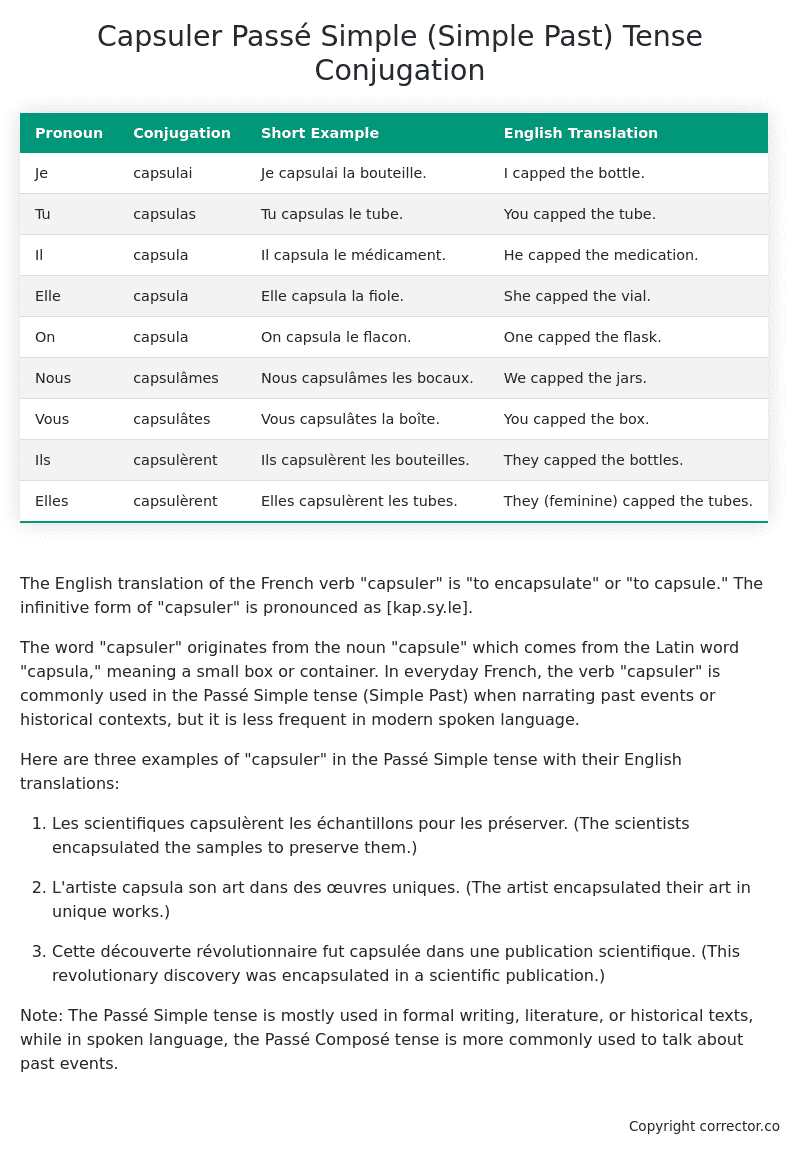Passé Simple (Simple Past) Tense Conjugation of the French Verb capsuler
Introduction to the verb capsuler
The English translation of the French verb “capsuler” is “to encapsulate” or “to capsule.” The infinitive form of “capsuler” is pronounced as [kap.sy.le].
The word “capsuler” originates from the noun “capsule” which comes from the Latin word “capsula,” meaning a small box or container. In everyday French, the verb “capsuler” is commonly used in the Passé Simple tense (Simple Past) when narrating past events or historical contexts, but it is less frequent in modern spoken language.
Here are three examples of “capsuler” in the Passé Simple tense with their English translations:
-
Les scientifiques capsulèrent les échantillons pour les préserver.
(The scientists encapsulated the samples to preserve them.) -
L’artiste capsula son art dans des œuvres uniques.
(The artist encapsulated their art in unique works.) -
Cette découverte révolutionnaire fut capsulée dans une publication scientifique.
(This revolutionary discovery was encapsulated in a scientific publication.)
Note: The Passé Simple tense is mostly used in formal writing, literature, or historical texts, while in spoken language, the Passé Composé tense is more commonly used to talk about past events.
Table of the Passé Simple (Simple Past) Tense Conjugation of capsuler
| Pronoun | Conjugation | Short Example | English Translation |
|---|---|---|---|
| Je | capsulai | Je capsulai la bouteille. | I capped the bottle. |
| Tu | capsulas | Tu capsulas le tube. | You capped the tube. |
| Il | capsula | Il capsula le médicament. | He capped the medication. |
| Elle | capsula | Elle capsula la fiole. | She capped the vial. |
| On | capsula | On capsula le flacon. | One capped the flask. |
| Nous | capsulâmes | Nous capsulâmes les bocaux. | We capped the jars. |
| Vous | capsulâtes | Vous capsulâtes la boîte. | You capped the box. |
| Ils | capsulèrent | Ils capsulèrent les bouteilles. | They capped the bottles. |
| Elles | capsulèrent | Elles capsulèrent les tubes. | They (feminine) capped the tubes. |
Other Conjugations for Capsuler.
Le Present (Present Tense) Conjugation of the French Verb capsuler
Imparfait (Imperfect) Tense Conjugation of the French Verb capsuler
Passé Simple (Simple Past) Tense Conjugation of the French Verb capsuler (You’re reading it right now!)
Passé Composé (Present Perfect) Tense Conjugation of the French Verb capsuler
Futur Simple (Simple Future) Tense Conjugation of the French Verb capsuler
Futur Proche (Near Future) Tense Conjugation of the French Verb capsuler
Plus-que-parfait (Pluperfect) Tense Conjugation of the French Verb capsuler
Passé Antérieur (Past Anterior) Tense Conjugation of the French Verb capsuler
Futur Antérieur (Future Anterior) Tense Conjugation of the French Verb capsuler
Subjonctif Présent (Subjunctive Present) Tense Conjugation of the French Verb capsuler
Subjonctif Passé (Subjunctive Past) Tense Conjugation of the French Verb capsuler
Subjonctif Imparfait (Subjunctive Imperfect) Tense Conjugation of the French Verb capsuler
Subjonctif Plus-que-parfait (Subjunctive Pluperfect) Tense Conjugation of the French Verb capsuler
Conditionnel Présent (Conditional Present) Tense Conjugation of the French Verb capsuler
Conditionnel Passé (Conditional Past) Tense Conjugation of the French Verb capsuler
Conditionnel Passé II (Conditional Past II) Tense Conjugation of the French Verb capsuler
L’impératif Présent (Imperative Present) Tense Conjugation of the French Verb capsuler
L’impératif Passé (Imperative Past) Tense Conjugation of the French Verb capsuler
L’infinitif Présent (Infinitive Present) Tense Conjugation of the French Verb capsuler
L’infinitif Passé (Infinitive Past) Tense Conjugation of the French Verb capsuler
Le Participe Présent (Present Participle) Tense Conjugation of the French Verb capsuler
Le Participe Passé (Past Participle) Tense Conjugation of the French Verb capsuler
Struggling with French verbs or the language in general? Why not use our free French Grammar Checker – no registration required!
Get a FREE Download Study Sheet of this Conjugation 🔥
Simply right click the image below, click “save image” and get your free reference for the capsuler Passé Simple tense conjugation!

Capsuler – About the French Passé Simple (Simple Past) Tense
Formation
Usage
Narration
Historical Context
Interactions with other tenses
Passé Composé
Imparfait
Conditional and Subjunctive
Summary
I hope you enjoyed this article on the verb capsuler. Still in a learning mood? Check out another TOTALLY random French verb conjugation!


